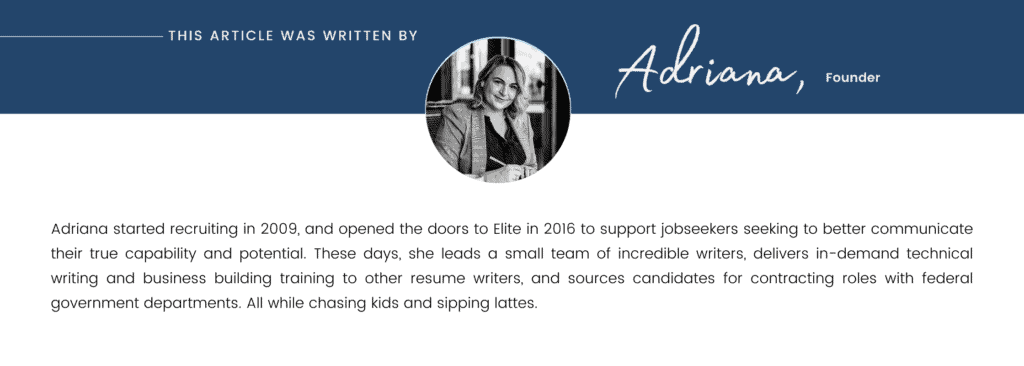 Adriana Modersitzki
Adriana Modersitzki

When we work with female leaders in the Australian Public Service on their resumes, career strategy and interview preparation, we’re supporting them to take on leadership roles, champion inclusive practices, collaborative approaches, and transform organisational culture in a way that ultimately enhances the overall well-being of employees, regardless of gender.
That’s right. There is overwhelming evidence that shows that as more women move into leadership roles, everyone wins. We experience greater diversity of thought, which not only enriches decision-making processes but also ensures that policies are more reflective of the diverse needs of both men and women. This trickles down into internal workplace culture and policy, and in public sector roles it can influence wider policy fostering a more inclusive and diverse environment.
The thing is, while we’re having more conversations about representation, the issue of gender imbalance remains a critical concern. We’re not there yet. Despite the progress we’ve achieved, statistics still highlight the significant disparities women face, both in the workplace and on the home front. The country’s gender pay gap persists, and according to the Workplace Gender Equality Agency, women are still underrepresented in leadership positions. So how do we improve that representation? How do we achieve this ‘trickle-down’ effect, and experience the benefits of increased representation in our public service leadership teams?
Mentoring.
Yep. Mentoring. This is such a powerful tool for aspiring female leaders, and yet it’s hugely under-utilised. Today, we want to take a look at the ways that mentoring can benefit women during their careers, what a great mentoring relationship should look like, and reflect on some top tips from experienced APS leaders on approaching and managing these invaluable relationships.
Because we know that by supporting more women to actively engage in mentoring and mentorship, we can help to keep turning the tide and promoting greater equality and representation.
Let’s get into it.
A common trend that’s observed is the tendency of women to self-limit and censor themselves before even applying for opportunities. In many instances, women often impose self-limitations when considering new job opportunities, influenced by a much broader range of factors than their male counterparts consider. This includes a tendency to downplay achievements or specific skills, concerns about juggling home responsibilities and workplace responsibilities, and often, a boatload of misplaced self-doubt. These things can all pile up and contribute to many women not even putting themselves forward for opportunities they could excel at.
Overcoming these self-imposed limitations may be uncomfortable at times, but the impact of this work has a ripple effect out to a person’s colleagues, team, and even the wider community, ultimately fostering a more inclusive and diverse professional landscape. The juice is worth the squeeze!
This is again, why mentoring is so important to women’s career advancement. Whether it happens in a formal or an informal setting, mentoring can help women and kicking those limiting beliefs to the curb, take the next steps in their career, ask for more support, or even money and gain confidence when speaking about their achievements.
Check out this blog on how to critically review your capabilities against a role, and read on here for tips on advancing your public service career and leadership development though mentoring.
An aspiring female leader in the public service might choose to seek out a mentor for several reasons. Firstly, mentoring provides an opportunity for the mentee to gain insights and advice from a more experienced counterpart in their field. This guidance can be crucial in navigating the complexities of the workplace, understanding organisational dynamics, and developing effective leadership skills.
The lessons learned from mentors include effective communication, strategic thinking, and self-reflection. By actively seeking mentorship, aspiring female leaders can gain insights that propel them forward in their careers.
A mentor and mentee relationship is very rarely one sided, and we’ve heard from several APS leaders that say their role as a mentor has provided them with undeniable value. Whether it’s walking away from a formal mentoring conversation with a different perspective on an issue, or a reinforced belief in their own skills, experience and knowledge, a positive mentoring relationship benefits both parties!
An aspiring female leader in the public service might choose to seek out a mentor for several reasons. Firstly, mentoring provides an opportunity for the mentee to gain insights and advice from a more experienced counterpart in their field. This guidance can be crucial in navigating the complexities of the workplace, understanding organisational dynamics, and developing effective leadership skills.
The lessons learned from mentors include effective communication, strategic thinking, and self-reflection. By actively seeking mentorship, aspiring female leaders can gain insights that propel them forward in their careers.
A mentor and mentee relationship is very rarely one sided, and we’ve heard from several APS leaders that say their role as a mentor has provided them with undeniable value. Whether it’s walking away from a formal mentoring conversation with a different perspective on an issue, or a reinforced belief in their own skills, experience and knowledge, a positive mentoring relationship benefits both parties!
We work with, listen to, and learn from some pretty fabulous people, including established public service leaders. The Elite Collective is often engaged directly by departments, whether it’s for outplacement services, or as part of an aspiring or established SES leaders performance and capability development. Given the emphasis we put on relationship, we’ve been able to gather insights and reach back for conversations and insights from past clients.
As we navigate the future of work, it’s an ongoing job to dismantle barriers, challenge self-limiting beliefs, and provide aspiring female leaders with the tools and support needed to thrive both professionally and personally. From overcoming self-limiting beliefs to fostering confidence and navigating career opportunities, career coaching services like The Elite Collective and mentoring relationships go hand in hand, and play a pivotal role in shaping the trajectory of female leaders.
Mentoring and career supports are tools we all should be leveraging. But they’re often under-utilised. So if you have goals and aspirations for public service leadership, kick things up a notch and start reaching out to form these relationships now.

We respectfully acknowledge the traditional custodians of the land upon which we live and work, the Ngunnawal people.
We acknowledge and respect their continuing culture and the contribution they make to the life of this city and this region, and extend that same respect to all Aboriginal and Torres Strait Islander people.